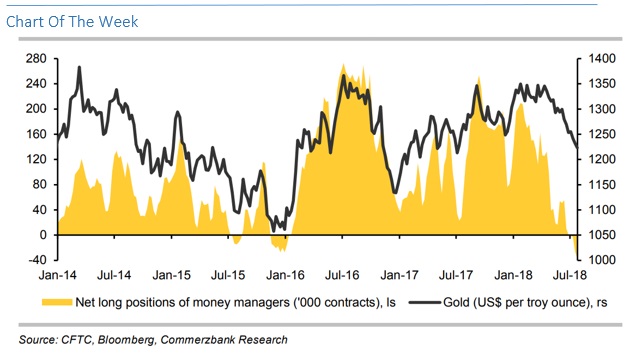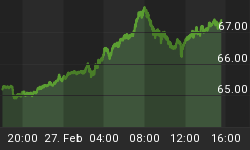Monday, July 30, 2018
S&P 500 nears record. The S&P 500 broke an all-time high in January, and the markets have seen a lot of volatility since, as well as higher inflation and a trade war. However, the S&P 500 is now approaching that record high once again, fueled by job growth and a strong second quarter GDP figure. Still, risks remain. The Fed is continuing to tighten rates, corporate earnings have been mixed and most economists believe the second quarter growth figure is as good as its going to get.

(Click to enlarge)
- Speculative pessimism on gold has reached a record level, according to Commerzbank.
- Net short positions hit a record 36,400 positions for the week ending on July 24, according to the U.S. CFTC.
- The shorts are helping to undercut gold prices and investors are pessimistic about further hikes in interest rates.
- Meanwhile, investors are keeping an eye on several meetings of central banks this week, including in the U.S., Japan, the UK, Brazil and India.
Markets
Strong U.S. GDP, but could be fleeting. U.S. GDP grew at a 4.1 annualized rate in the second quarter, one of the strongest performances in four years. Bloomberg argues that there are problems ahead, particularly because the stock market is still overvalued compared to GDP growth. At 154 percent of GDP, the total value of all stocks are significantly higher than the 130 percent of GDP that the market has traditionally traded at. So, to get back to that level, GDP will have to pick up significantly, an unlikely scenario, or stocks will have to correct.
Big Three automakers lower profit guidance. The U.S.’ Big Three automakers lowered their profit guidance for 2018 due to higher costs stemming from steel and aluminum tariffs. The cost inflation from the tariffs are sullying what has otherwise been a strong period for auto sales. GM (NYSE: GM) and Ford (NYSE: F) each said that the tariffs erased about $300 million in profits from their second quarter results, compared to a year earlier. Related: China Pulls Approval For New Facebook Venture
Iran’s currency hits record low. Iran’s currency, the rial, dropped to a record low of 100,000 rials to the dollar as an economic crisis and the tightening screws of U.S. sanctions take their toll. The rial has fallen by half in just the past four months. There is no relief on the horizon as sanctions will increasingly cut into Iran’s oil exports, with a November deadline quickly approaching.
Commodities
Investors pessimistic on base metals. Investors stepped up short bets on gold and copper in the past week, a sign of pessimism. Some volatility in Asian stock markets are part of the problem, along with forthcoming data on manufacturing activity in both China and the U.S., both of which investors are betting turn out to be bearish. Zinc has fallen sharply, down nearly 20 percent since mid-June.
Government assistance for agriculture could expand. “There are increasing calls for further financial aid from the government in the agricultural sector, be it because of the trade dispute – the U.S. administration has already announced support for affected farmers – or because of the damage caused by the hot and dry conditions,” Commerzbank wrote in a note. Australia has suffered through one of its driest winters in history. German farmers are demanding help as well. And of course, the U.S. government is offering $12 billion in assistance to U.S. farmers because China’s trade tariffs on U.S. soybeans has caused prices to crash.
Japanese automakers team up for cobalt supply. Japan’s automakers are forming a joint procurement entity in order to secure a stable supply of cobalt. Japan’s Ministry of Economy, Trade and Industry (METI) announced a plan last week to setup an organization that would help Japan’s carmakers – including Nissan, Toyota and Honda – obtain long-term supplies of cobalt while also helping them avoid conflict minerals or child labor, according to Reuters. “The new entity is aimed to disperse risks among battery users for securing cobalt supply which is dominated by DRC and at a time when growth rate of cobalt’s demand is still uncertain,” a government source said. Cobalt is a crucial component of lithium-ion batteries used in electric vehicles.
Energy
North Sea sees oil revival. The North Sea has seen an uptick in drilling activity, and the industry is deploying more rigs and hiring again. The FT reports that the rebound is the result of both higher oil prices and the success of the last two licensing rounds in the UK. The last offshore round, held in May, awarded 123 licenses to 61 companies, including Royal Dutch Shell (NYSE: RDS.A) and BP (NYSE: BP). North Sea production could average close to 2 million barrels of oil equivalent per day (boe/d) this year, the highest since 2010. Still, drilling is at a small fraction of what it was a decade ago.
Oil majors post strong profits, but share prices hit. Several oil majors, including Chevron (NYSE: CVX), Royal Dutch Shell (NYSE: RDS.A), ExxonMobil (NYSE: XOM), BP (NYSE: BP) and Total (NYSE: TOT), posted strong profits for the second quarter, often double or triple the level from a year earlier. The industry posted its best quarter in years and several of them hiked dividends and vowed to repurchase shares. However, by and large, their share prices were hit as Wall Street had expected more.
Related: Bears And Bulls Duke It Out In Crypto Markets
Imperial Oil using world’s largest autonomous truck. Imperial Oil (TSE: IMO) says it has successfully deployed the world’s largest autonomous haul truck at its Kearl oil sands project. The truck can haul 400 tons, and the pilot project is expected to be ramped up to seven trucks by the end of the year.
Cryptocurrencies
New regulated cryptocurrency exchange launches. The first regulated exchange for cryptocurrencies, blocktrade.com, opened for beta testing. The exchange is regulated under the MiFID II framework, and it will allow for trading in Bitcoin, Ethereal, Litecoin, Bitcoin Cash and Ripple. The exchange will fully roll out in September. “This is an ideal way for regulators across Europe to recognize cryptocurrencies as a new asset class and put in a regulatory framework,” said Luka Gubo, CEO of Blocktrade.com.
Flat trading at start of week. It was a quiet weekend in cryptocurrency trading and Monday started off flat. Bitcoin was flat at just over $8,100, holding onto the significant gains made since the middle of July. Bitcoin is up nearly a third since July 14. Bitcoin is facing technical resistance levels, and analysts wonder whether the technicals could induce another bearish selloff.
Islands race to host cryptocurrencies and blockchain. The New York Times details the lengths to which islands and territories such as Malta, Bermuda, Gibraltar and Liechtenstein are going to attract new investment in cryptocurrencies, blockchain technologies and other digital startups. “The competition for cryptocurrency companies is part of a broader rush by governments to figure out how to approach a new industry that took on outsize prominence over the last year. Becoming a crypto center has many potential upsides, including jobs and tax revenue,” the New York Times wrote. “But the drive to be a crypto nexus also comes with significant risk.”
By Josh Owens for Safehaven.com
More Top Reads From Safehaven.com
















